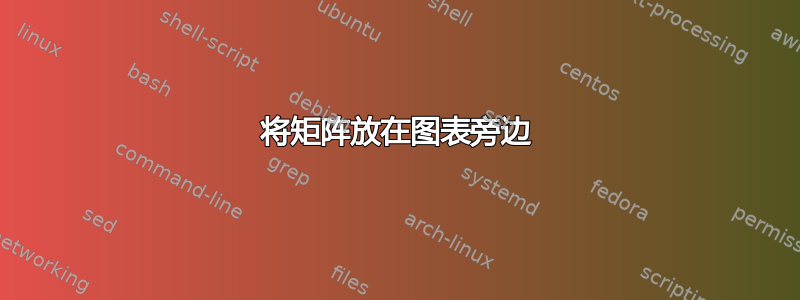
\documentclass[a4paper,12pt,twoside]{report}
\usetikzlibrary{decorations.markings}
\begin{document}
\begin{figure}[hbt!]
\begin{center}
\begin{tikzpicture}[scale=0.95,
thick,
acteur/.style={
circle,
fill=black,
thick,
inner sep=2pt,
minimum size=0.2cm,scale=0.65
}
]
\node (a1) at (0,0) [acteur,label=left:\footnotesize{1}]{};
\node (a2) at (1.5,0) [acteur,label=right:\footnotesize{2}]{};
\node (a3) at (1.5,1.5) [acteur,label=right:\footnotesize{3}]{};
\node (a4) at (0,1.5) [acteur,label=left:\footnotesize{4}]{};
\node (a5) at (.75,3) [acteur,label=above:\footnotesize{5}]{};
\draw [green, decoration={markings, mark=at position 0.5 with {\arrow{>}}}, postaction={decorate}] (a1) -- (a2);
\draw [blue](a2) -- (a3);
\draw [green, decoration={markings, mark=at position 0.5 with {\arrow{>}}}, postaction={decorate}] (a3) -- (a4);
\draw [red](a4) -- (a1);
\draw [blue] (a4) -- (a5);
\draw [red] (a5) -- (a3);
A(G)=
\left[ {\begin{array}{rrrrr}
0 & \mathrm{i} & 0 & 1 & 0 \\
-\mathrm{i} & 0 & -1 &0 &0 \\
0 & -1 & 0 & \mathrm{i} & 1\\
1 & 0 & -\mathrm{i} &0 & -1\\
0 & 0 &1 &-1 &0
\end{array} } \right]
\end{tikzpicture}
\caption{ $G, A(G)$}\label{F2}
\end{center}
\end{figure}
\end{document}
这里我想将矩阵放在图表的右侧。该怎么做?
答案1
您可以(应该)在图像外面写入矩阵:
我擅自重写了您的图像的代码(目的是更简单):
\documentclass[a4paper,12pt,twoside]{report}
\usepackage{mathtools} % new
\usepackage{tikz}
\usetikzlibrary{decorations.markings}
\begin{document}
\begin{figure}[hbt!]
\centering
\begin{tikzpicture}[baseline=(a3.south),
acteur/.style = {circle, draw, fill, inner sep=2pt,
node contents={}},
->-/.style = {decoration={markings, mark=at position 0.5 with {\arrow{>}}},
draw=#1,
postaction={decorate}},
every label/.append style = {font=\footnotesize},
every path/.append style = semithick
]
\node (a1) [acteur,label=left:1];
\node (a2) at (1.5,0.0) [acteur,label=right:2];
\node (a3) at (1.5,1.5) [acteur,label=right:3];
\node (a4) at (0.0,1.5) [acteur,label=left:4];
\node (a5) at (.75,3.0) [acteur,label=5];
%
\draw [->- = green] (a1) -- (a2);
\draw [blue] (a2) -- (a3);
\draw [->- = blue] (a3) -- (a4);
\draw [red] (a4) -- (a1);
\draw [blue] (a4) -- (a5);
\draw [red] (a5) -- (a3);
\end{tikzpicture}
\qquad
$A(G)= \begin{bmatrix*}[r]
0 & i & 0 & 1 & 0 \\
-i & 0 & -1 & 0 & 0 \\
0 & -1 & 0 & i & 1 \\
1 & 0 & i & 0 & -1 \\
0 & 0 & 1 & -1 & 0
\end{bmatrix*}$
\caption{ $G, A(G)$}\label{Fd2}
\end{figure}
\end{document}
答案2
\documentclass[a4paper,12pt,twoside]{report}
\usetikzlibrary{decorations.markings}
\begin{document}
\begin{figure}[hbt!]
\begin{center}
\begin{tikzpicture}[scale=0.95,
thick,
acteur/.style={
circle,
fill=black,
thick,
inner sep=2pt,
minimum size=0.2cm,scale=0.65
}
]
\node (a1) at (0,0) [acteur,label=left:\footnotesize{1}]{};
\node (a2) at (1.5,0) [acteur,label=right:\footnotesize{2}]{};
\node (a3) at (1.5,1.5) [acteur,label=right:\footnotesize{3}]{};
\node (a4) at (0,1.5) [acteur,label=left:\footnotesize{4}]{};
\node (a5) at (.75,3) [acteur,label=above:\footnotesize{5}]{};
\draw [green, decoration={markings, mark=at position 0.5 with {\arrow{>}}}, postaction={decorate}] (a1) -- (a2);
\draw [blue](a2) -- (a3);
\draw [green, decoration={markings, mark=at position 0.5 with {\arrow{>}}}, postaction={decorate}] (a3) -- (a4);
\draw [red](a4) -- (a1);
\draw [blue] (a4) -- (a5);
\draw [red] (a5) -- (a3);
\draw (7, 1.5) node {$A(G)=
\left[ {\begin{array}{rrrrr}
0 & \mathrm{i} & 0 & 1 & 0 \\
-\mathrm{i} & 0 & -1 &0 &0 \\
0 & -1 & 0 & \mathrm{i} & 1\\
1 & 0 & -\mathrm{i} &0 & -1\\
0 & 0 &1 &-1 &0
\end{array} } \right]$};
\end{tikzpicture}
\caption{ $G, A(G)$}\label{Fd2}
\end{center}
\end{figure}
\end{document}



